Gary Cee’s Wall Street Journal crossword, “In Absentia”—Jim P’s review
It’s Wednesday folks, and I guess that means no added hints (i.e. circles) in the grid. Did you figure out the theme without them? As for me, it took a couple of minutes after I started writing up this post before I caught on.
The MISSING LINK is our revealer today, clued as [Hypothetical human ancestor, or what connects the two words of each starred answer].
My first thought was a literal one; that is, that the word “link” should be inserted between the words. But “mango link” and “link nectar” make no sense. My second thought was to do the same thing with the word “missing,” but clearly that was even worse.
Finally, I took a closer look at the letters spanning each pair of words. Therein lies the answer. Each term hides a synonym of “missing.”
- 17a [*Tropical juice] MANGO NECTAR. Gone.
- 37a [*Deepwater fish with doglike teeth] SEA WOLF. AWOL (Absent WithOut Leave, in case you didn’t know).
- 11d [*Long-handled mallets] POLO STICKS. Lost.
- 29d [*Decorative folding] ORIGAMI ART. MIA (Missing In Action). Dupe of the word “missing,” but it’s layered deep down, so I didn’t even notice until now.
This was clever and fun—much more fun than if the answer was handed to you with circles. I especially like the inclusion of the two military acronyms which I think have gained wide enough acceptance to become general knowledge. And there are myriad ways of hiding the letters MIA, but only a few where the letters actually span two separate words. ORIGAMI ART might be on the verge of “green paintery”, but I think it’s the best, most interesting, choice. (There is a better one, SAM I AM, but sadly, it’s only six letters long.)
By the way, I like the revealer clue as well in that it doesn’t refer to monkeys or apes but a more accurate description of the term.
With the theme answers in a pinwheel configuration, there aren’t any marquee fill answers, but there are still plenty of fun entries: ANGELIC, RATTLER, HONESTY, PLASMA, EAST SIDE, SEASONAL, and PIMENTO which I wanted to spell PIMIENTO. (Apparently, both are acceptable.)
I don’t love seeing ILO [Worldwide workers’ agcy.] in a grid, but that is literally the only questionable entry I see. Very clean fill throughout.
A fun puzzle that still made me think after all was said and done. Four stars.
Jules Markey’s New York Times crossword—Amy’s recap
The theme is phrases whose first words also mean “talk,” basically (with one exception), clued as if the phrases mean something more literal. The theme’s wildly uneven, though.
- 19a. [Talk trash?], UTTER RUBBISH. “Talk trash” is a familiar phrase, as is UTTER RUBBISH. What a neat theme! Let’s see where this is going …
- 33a. [Recite aphorisms?], STATE MOTTOES. Okay, “recite aphorisms” is a big nothing. First and second theme entries are not consistent with each other.
- 41a. [Perform poetry?], EXPRESS LINES. You would never say someone reading poetry aloud was “expressing lines,” but whatever. I prefer express lanes, personally.
- 54a. [Narrate audiobooks?], SPEAK VOLUMES. Okay, but reading a book out loud is not “speaking the book.” The verb doesn’t work in the theme answer usage here. Also, this one’s the most off-base of the four, because if something speaks volumes, speak is basically being used in the communication sense.
Whereas UTTER = verb vs. adjective, STATE = verb vs. noun, EXPRESS = verb vs. adjective. SPEAK is a verb in the original and reimagined meanings, and I’m not sure why the theme was accepted. Plus there’s that familiar phrase “talk trash” in one clue that sticks out as different from the three other clues that are just “verb + noun” phrases for which you will not find any dictionary entries.
There was a bunch of fill that was underwhelming, especially given the 76-word grid and ordinary theme square count of 48. UAR, EEN, lots of dullness like ODES and ERRATA and SENT TO. NO LOSS clued as [“Good riddance!”], as if we are actually all running around saying “No loss!”—and overlapping with NO PULP. I did like RUSTLES UP and SOFT-PEDAL, and a SAMOSA is always welcome, but the rest of the fill made me yawn.
2.5 stars from me.
Mark Feldman’s Universal Crossword, “Getting Oriented”—Judge Vic’s write-up
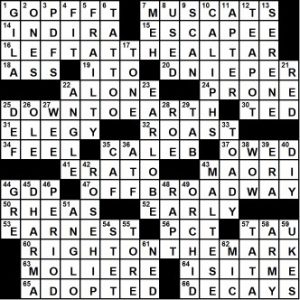
Mark Feldman’s Universal Crossword, “Getting Oriented”–5/29/19, solution
Hmm! I don’t know about this. What do you think?
- 16a [Direction for a bride’s family?] LEFT AT THE ALTAR—This phrase I can punnily imagine as a direction. “Walk down this aisle, take a left at the altar.”
- 25a [Direction for a returning astronaut?] DOWN TO EARTH–Wherever an astronaut is, on a mission, he/she is headed “down” on the return. That I get. But I’m having trouble crafting that into a direction. “So, from the moon, you go straight down to Earth.”
- 47a [Direction for a budget-conscious NYC theatergoer?] OFF-BROADWAY–“That restaurant is–well, it’s right off Broadway around Ninth or Tenth Street.” This phrase will get you near Larry’s Pizza in Little Rock, but, as directions go, it’s pretty vague, no? As a term of art, the hyphenated noun refers to Manhattan theaters with a certain seating capacity, right?
- 60a [Direction for a sprinter to scoot over?] RIGHT ON THE MARK–No matter how I verbalize it, I cannot make 60a work, at least not at a real track meet. A sprinter (or distance runner) hears “On your mark,” not “On the mark.” And there is not really a mark as such. A sprinter would have a lane assignment and starting blocks.
I don’t see anything here other than that left, right, down, and off are, or can be, key words in giving directions to a traveler … and each has its appearance in a separate ILSA that has nothing to do with giving directions. But the direction-giving thing has to connect up with a little more legitimacy, in order for the puns to work. I’d feel a little better, I think, if we were dealing with left, right, down, and up. Two sets of opposites, with each word being thought of independently as a direction of sorts in conversation. (Pretty sure I’ve made a puzzle with that theme before.)
Enough analysis. From the supporting cast, the following evoked comments:
1a GO PFFT–This is kinda fun, although this type of fill, where spellings are conjured up to represent sounds that, imo, were meant to be unspellable, is starting to run amok, if you ask me. (Mwahahahaha!)
20a DNIEPER–Flower seldom seen in crosswords these days.
64a IS IT ME–The grammatically correct, literary-based IS IT I catches a lot of flak. How can this rendering be better?
5d FRAILTY–This word isn’t seen much, anywhere. I wonder why.
42 ROSE HIP–I don’t think I’ve ever encountered this term outside of crosswords. And I’ve not seen it in too many of them.
2 stars from me.
Mira Martin-Gray and Niamh Girling’s AVCX, “Use Your Illusion” — Ben’s Review
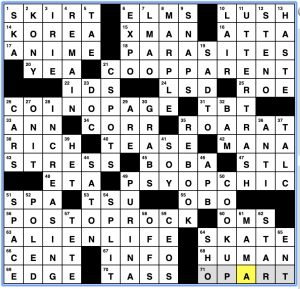
AVCX 5/29 — “Use Your Illusion”
We have a second week of collaborative puzzles from the AVCX with this week’s edition. This week’s puzzle is a 2.5/5 on the difficulty scale from Mira Martin-Gray and Niamh Girling, who are making their constructing debut with today’s puzzle. Congrats, Mira and Niamh!
Let’s walk through the theme on this one:
- 21A: One helping raise a child by doing a monthly volunteer shift? — CO-OP PARENT
- 26A: Time when arcades were raking in the quarters? — COIN-OP AGE
- 49A: Fashion worn to confuse and destabilize an enemy? — PSY-OP CHIC
- 56A: Music genre in the recovery room after surgery? — POST-OP ROCK
- 71A: Illusionary genre, and how you might describe this puzzle’s theme answers if you really like them — OP ART
So: I found this cute, if a little bland, theme-wise. I don’t like the presumption of how I’ll potentially describe the answers in the revealer, since for the most part, the way they’re adding OP to otherwise standard entries (CO-PARENT, COINAGE, PSYCHIC, and POST-ROCK) isn’t quite as transformative as I’d like it to be.
Lil MAMA‘s “Lip Gloss” was a TRL standard in 2007, and that locker-slam beat is still pretty fresh!
- It’s great to see a different clue for ATTA other than “___ boy!” or “___ girl!”, but I don’t think the “Flour used in naan bread” is quite well-known enough to be a substitute for that in a puzzle on the easier side of things.
- CORR. for “Not wrong” wasn’t..wrong, but it was unsatisfying to me, as far as abbreviations go. Same for HET (since the clue “Straight, but not necessarily narrow?” doesn’t really point to abbreviation) and OBO (which stands for “Or Best Offer”, if you’re not a user of Craigslist/Facebook Marketplace)
- I enjoyed learning about “Goldilocks Zones” after finishing the puzzle today – as the name suggests, these are areas that are neither too hot or too cold to be habitable and are just right to support ALIEN LIFE.
While I was a little underwhelmed with the theme, there was a lot of personality shown in the choice of fill and cluing here. I hope to see more in the future from Mira and Niamh!
Roland Huget’s LA Times crossword – Gareth’s summary
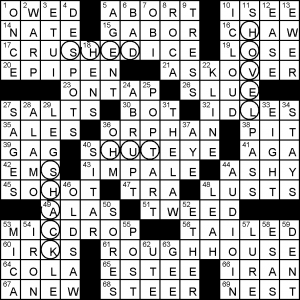
LA Times
190529
I enjoyed the wordplay of the revealing ROUGHHOUSE translating to SHACK/HUT/SHED and HOVEL. These words are then concealed in four starred answers. I added the circles to the answer key to highlight those parts more clearly. Unusually, the hiding was within one word only in all four cases.
The grid design was the pinwheel usually favoured of early week puzzles that typically leads to fast solving and grids without many forced or difficult answers. I had a few problems in the area of the unknown to me SHOVELPASS, but otherwise it was a typical easy LA Times puzzle. My favourite entry by far was AUDIOIN, with its nutty IOI vowel pile-up.
3 Stars
Gareth
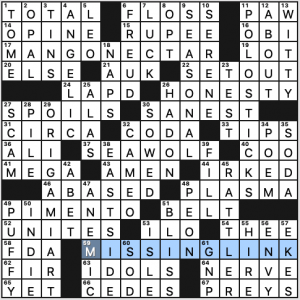
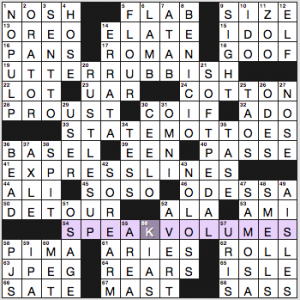
WSJ – A minor, pedantic nit with “two military acronyms.” While AWOL is an acronym (pronounced as a word), MIA is an initialism (pronounced letter-by-letter). See here.
And a bit thoughtless putting them together in the puzzle just two days after Memorial Day.
Many (most?) authorities allow “acronym” to include initialisms.
I think that’s a good idea because of all the “in between” cases. Which is “mpeg”? “MSDOS”? The pedantic view is they’re neither. The pragmatic definition makes them acronyms.
I’d be careful about saying that “many” or “most” authorities allow a blurring of the two terms — you’ve cited only one. I mean no disrespect to you; rather, I’m noting that everyone needs to be careful about overstating the support/documentation they found for or against anything.
It’s equally useful, or useless, to note that I have worked with many copy editors, all of whom drew a sharp distinction between the two, as did the sources they relied on (The Chicago Manual of Style, Bryan Garner’s various books, the AP style guide).
Thanks for raising an interesting question (what do we call a hybrid such as MS-DOS?).
I just checked the Random House Unabridged (Will Shortz’s standard) and American Heritage. Both support acronym including initialisms. I’m not sure about “most,” but these three make me confident about “many.”
WSJ: Acknowledging my standard irk at the misconception of a “missing link” being employed uncritically. That isn’t what evolution is about. Here’s a basic primer.
Crosswords, as a relatively brainy endeavor, have an obligation not to disseminate gross misinformation.
Doesn’t “hypothetical” meet that obligation?
I just think of “missing link” as shorthand for “transitional form as yet undiscovered, unsurprisingly, due to the inherent incompleteness of the fossil record.”
Well, huh. I liked the NYT today and thought the repurposing of common phrases was clever. The last one didn’t bother me because the idiom ‘speak volumes’ is always (I think) used metaphorically — it doesn’t refer to actual speaking. De gustibus etc.
I like your acronym-initialism distinction, and I wish it was widely accepted. But it’s not. In fact, every dictionary I’ve looked at define an acronym to be both an acronym (by your definition) *and* an initialism. (For example, look up acronym here .) I think this is in step with common usage, as well.
So, I think we need to begrudgingly concede that MIA is an acronym.
(This is in response to Runaway Pancake above. Apparently, I didn’t click the “Reply” button correctly.)
If only you had replied “correctly”, we would have had a stack of pancakes.
Joe Pancake: Oxford maintains the distinction, in both US and British/world English:
https://en.oxforddictionaries.com/definition/us/initialism
https://en.oxforddictionaries.com/definition/initialism
The Cambridge Dictionary and the Collins Dictionary also maintain the distinction.
In addition, MW writes, “Our research shows that acronym is commonly used to refer to both types of abbreviations” — which only means “This is how people, many of whom don’t understand the distinction, use this term.” Popular usage may erode the distinction between these two terms, but that doesn’t mean it should be eroded.
The specificity of language is not only beautiful, it’s also extremely useful. So I stand on the side of “Maintain the distinction.”